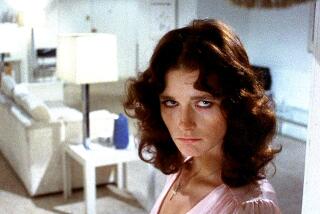John Dahl on Making a Killing
When John Dahl first moved to Los Angeles from his native Billings, “people here thought Montana was a part of Canada,” he observes in a flat Western deadpan.
Now that it’s become a chic getaway for Hollywood celebrities, Dahl likes to torture people with stories “about how rotten it is there.”
His unique brand of soft-spoken irony and that wide-as-the-open-skies country-boy visage could explain why Hollywood hasn’t been able to quite get a handle on Dahl’s three wry films noir: “Kill Me Again” starring Val Kilmer and his wife, Joanne Whaley-Kilmer; “Red Rock West,” with Nicolas Cage, and “The Last Seduction,” starring Linda Fiorentino and Bill Pullman, which has averaged more than $9,000 per screen since opening two weeks ago.
Variety critic and film historian Todd McCarthy calls Dahl’s work “deliciously nasty”--at turns menacing and amusing. Such inherent stylistic contradictions have initially caught more than one film executive off guard. “Dahl just doesn’t look the type,” says “Seduction” producer Jonathan Shestack. “His demeanor is extremely placid, controlled. He’s very pleasant. Then he makes movies about tormented, psychotic killers. And he does it very well.”
Audiences, however, have been ready to accept his work at face value--when given the chance. Despite Hollywood’s best efforts to sequester his movies, Dahl is fast developing a healthy cult following for his films noir.
MGM/UA basically threw away “Kill Me Again,” he says, only to have it emerge as a sleeper on video. Propaganda became nervous about “Red Rock.” “They kept trying to figure out what was wrong with it,” he says. Fearful of its box-office chances, the company sold it directly to HBO. The movie was subsequently released in theaters, confounding all expectations by grossing more than $2 million--unheard of for a film that debuted on the small screen and was already available on the video racks.
The same straight-to-HBO fate befell “The Last Seduction,” a piquant tale with a thoroughly irredeemable and compelling heroine, the kind of woman who can safely be categorized a “bitch”--and even revels at the moniker. As with “Red Rock,” Dahl’s latest effort first showed its moxie overseas, a possible portent of good things to come at the U.S. theatrical box office.
At 38, Dahl has worked in the film business long enough that he’s not confounded by his idiosyncratic career trajectory.
For a time, he subsisted directing music videos while writing screenplays. He got lucky on script No. 7, “Kill Me Again,” which he persuaded Propaganda to let him direct.
But in blockbuster-obsessed Hollywood, film noir has long been an endangered species. The genre intermittently sputters to life, as with Lawrence Kasdan, who brought it into the present with “Body Heat.” David Lynch laced his noir “Blue Velvet” with lots of purple. And, most recently, Quentin Tarantino’s “Pulp Fiction” puts its own anarchic spin on the genre.
But mostly, says Dahl, film noir is at the mercy of writers and directors who usually get it all wrong, stressing style over substance--lots of rainy streets and smoky rooms. “When the audience is too aware of the style, it’s deadly,” says Dahl. Citing a quintessential noir classic, “Double Indemnity,” by his idol Billy Wilder, Dahl says “style is not what drives that film. It’s the psychology of the characters.”
Another factor, he says, is that tabloid television has robbed noir of its exoticism. How can crime fiction compete with “America’s Most Wanted,” which presents true-life Gothic horror stories?
Like Lynch’s “Blue Velvet,” Dahl’s plots center “on a moral guy in an immoral world. What the main character suffers from is an injustice or a self-imposed affliction and he tries to set his life straight.”
Then, perhaps afraid that he may be sounding too highfalutin, Dahl interjects, “the element I like the most is betrayal and mistrust, the B-movie quality of that sleazy world.”
And like Tarantino, Dahl douses the melodramatic flames with splashes of irreverent humor. In Dahl’s case, much of the comedy comes at the expense of the hero’s naivete. “It’s a juggling act, alternating dramatic and funny. An actor like Nick Cage can be both at the same time. And I like to go along with the absurdity.”
Dahl’s the first to admit that there may be more than a tinge of autobiography in his heroes, men who find themselves simultaneously attracted to and trapped by their environments.
“Maybe it’s because I’m from the West and have no street smarts myself, but my main characters are always guys who are trying to be the best they can be. And that makes them vulnerable to criminals, who prey on them.”
Depending on how casting falls into place, Dahl will next start one of two films. The first, for producer Dino De Laurentiis, is Dahl and his brother Rick’s rewrite of “Unforgettable,” about a man wrongly accused of murdering his wife. The other, “When She Was Good,” is a loose remake of “Niagara,” a ‘50s suspense film that starred Marilyn Monroe and Joseph Cotten. The script has been updated to include more “ ‘90s issues” such as white-collar crime and spousal abuse.
When asked if he’s afraid of being limited by pigeonholing as a film noir director, Dahl shrugs, “There are worse genres to be stuck in. I’m just glad to have the opportunity to make another movie.”*
More to Read
Only good movies
Get the Indie Focus newsletter, Mark Olsen's weekly guide to the world of cinema.
You may occasionally receive promotional content from the Los Angeles Times.










